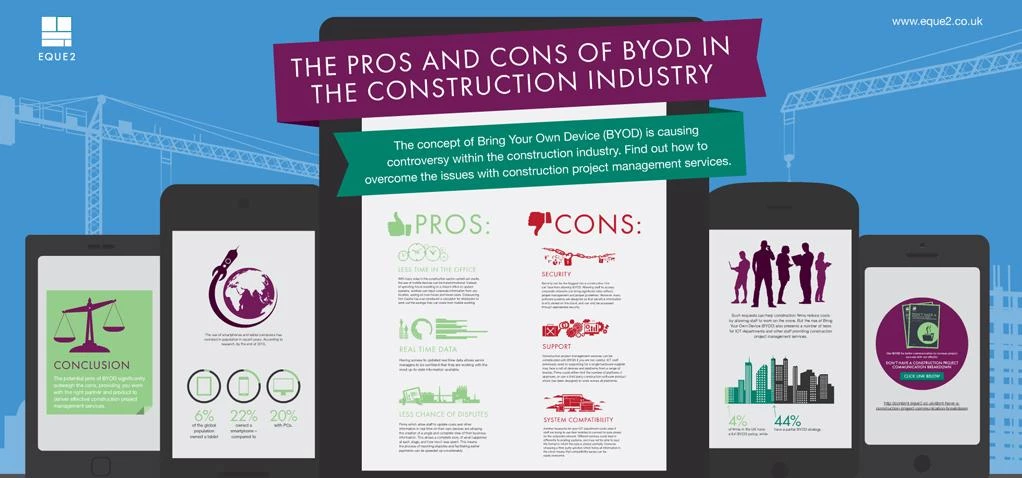
Partner Article
Pros & cons of BYOD in construction industry
The use of smartphones and tablet computers has rocketed in population in recent years. According to research, by the end of 2013, 6% of the global population owned a tablet, and 22% owned a smartphone – compared to 20% with PCs. But the phenomenon comes with challenges for firms in all sectors, faced with demands from staff wanting to use their own devices to carry out their work tasks.
Such requests can help construction firms reduce costs by allowing staff to work on the move. But the rise of Bring Your Own Device (BYOD) also presents a number of tests for ICT departments and other staff providing construction project management services. 4% of firms in the UK have a full BYOD policy, while 44% have a partial BYOD strategy.
Pros:
Less time in the office
With many roles in the construction sector carried out onsite, the use of mobile devices can be transformational. Instead of spending hours travelling to a distant office to update systems, workers can input corporate information from any location, saving on man-hours and travel costs. Outsourcing firm Capita has even produced a calculator for employers to work out the savings they can make from mobile working.
Real time data
Having access to updated real time data allows senior managers to be confident that they are working with the most up-to-date information available.
Less chance of disputes
Firms which allow staff to update costs and other information in real time on their own devices are allowing the creation of a single and complete view of their business information. This allows a complete story of what happened at each stage, and how much was spent. This means the process of resolving disputes and facilitating earlier payments can be speeded up considerably.
Cons:
Security
Security can be the biggest risk a construction firm can face from allowing BYOD. Allowing staff to access corporate networks can bring significant risks without proper management and proper guidelines. However, many software systems are designed so that sensitive information is only stored on the cloud, and can only be accessed through appropriate security.
Support
Construction project management services can be complicated with BYOD if you are not careful. ICT staff previously used to supporting for a single hardware supplier may face a raft of devices and platforms from a range of brands. Firms could either limit the number of platforms it approves, or use a third party construction software product which has been designed to work across all platforms.
System compatibility
Another headache for your ICT department could arise if staff are trying to use their mobiles to connect to data stored on the corporate network. Different devices could feed in differently to existing systems, and may not be able to read the format in which the data is stored centrally. However, choosing a third party solution which holds all information in the cloud means that compatibility issues can be easily overcome.
Conclusion
The potential pros of BYOD significantly outweigh the cons, providing you work with the right partner and product to deliver effective construction project management services.
This was posted in Bdaily's Members' News section by Wes Simmons .
Enjoy the read? Get Bdaily delivered.
Sign up to receive our popular morning National email for free.








 Raising the bar to boost North East growth
Raising the bar to boost North East growth
 Navigating the messy middle of business growth
Navigating the messy middle of business growth
 We must make it easier to hire young people
We must make it easier to hire young people
 Why community-based care is key to NHS' future
Why community-based care is key to NHS' future
 Culture, confidence and creativity in the North East
Culture, confidence and creativity in the North East
 Putting in the groundwork to boost skills
Putting in the groundwork to boost skills
 £100,000 milestone drives forward STEM work
£100,000 milestone drives forward STEM work
 Restoring confidence for the economic road ahead
Restoring confidence for the economic road ahead
 Ready to scale? Buy-and-build offers opportunity
Ready to scale? Buy-and-build offers opportunity
 When will our regional economy grow?
When will our regional economy grow?
 Creating a thriving North East construction sector
Creating a thriving North East construction sector
 Why investors are still backing the North East
Why investors are still backing the North East